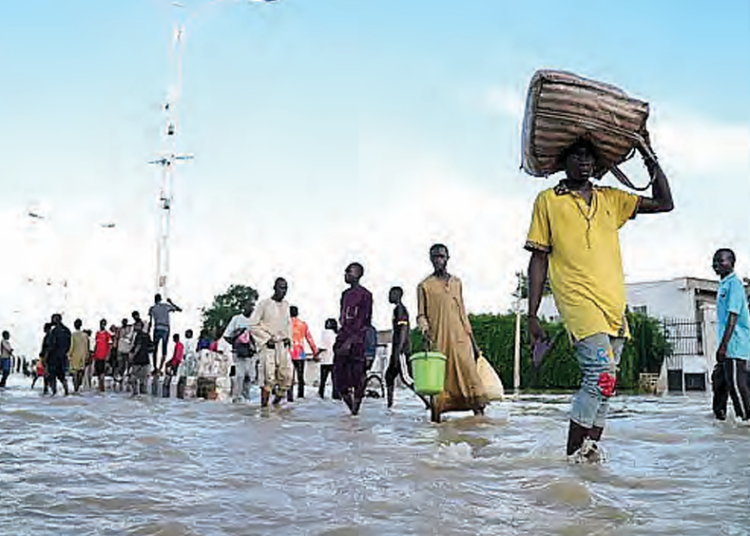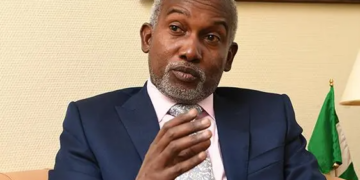Survivors of the recent Borno State flood whose houses were damaged have begged the federal and state governments to help them rebuild their homes.
Their appeal came after 20 days after of the disaster that submerged Maiduguri, the state capital, parts of Jere and Mafa local government areas.
It destroyed property worth billions of naira with many lives lost while farmlands and foodstuff were washed away,
Although, the state government has set up committees for the assessment of damaged structures as well as a committee for disbursement of relief packages to the victims, the most need of the victims is for their houses to be rebuilt before returning home.
As the flood receded and displaced persons began to return home, many families are still stranded.
Those still in rehabilitation camps are crying of hunger and appealing to government to assist them return home.
Mohammed Bulama Abdallah, who is still taking refuge at the Bakassi IDPs camp in Maiduguri with his two wives and seven children, said the flood totally destroyed his only house and displaced them.
Abdullah said the major challenge he was presently facing was his inability to finance the rebuilding of his destroyed home. Hence, he is appealing to the government to come to his aid.
“We can’t go home because we have no place to go. Our house was pulled down by the flood. Government should help us in rebuilding our homes. We were provided some food items some weeks ago, but they have finished. We need more food assistance from government while rebuilding our home,” he said.
Joro Gajere, a resident of Moduganari area of Maiduguri, who also said he was still living in the camp with his wife and children, said the flood pulled down three rooms in his four-room apartment.
He said that while he was in the camp with his families, his aged mother was managing the only room left in the house. He appealed to the government to help them rehabilitate their damaged structures.
Zainab Mohammed of Bulabulin Kasuwa area of Maiduguri who is a widow with seven children, said the rented apartment she was living with her children before the flood was still being evacuated of mud and debris brought by the flood.
She however commended government for bringing food to them in the camp, but said the food had since finished, appealed to government not to get tired of them.
How We Are Tackling Aftermath Of the Flood Disaster- SEMA
The director general, State Emergency Management Agency ( SEMA ) , Dr . Barkindo Muhammadu Saidu, said the agency had been on top of the situation throughout the period of the flood, adding that it even sensitised residents about the flood, having received an alert from NIMET over looming flooding across the federation.
He said when the incident occurred , the first thing they did was the establishment of a rapid response team responsible for search and rescue, adding that the other intervention established was the creation of Internally Displaced Persons (IDPs) where those that don’t have a place to go would stay.
He said during the period, those registered in the camp and those that could not make it to the camp due to reasons best known to them were provided food based on SEMA’s capacity.
He said when the flood started receding, SEMA collaborated with the Borno State Environmental Protection Agency (BOSEPA), Ministry of Reconstruction, Rehabilitation and Resettlement (RRR) and Ministry of Works and Housing to go and inspect buildings that were submerged to ascertain their quality and strength; whether they are fit for people to return.
“So where the buildings are not fit for habitation, we stopped people from entering in to utilise the structures. For the places good for habitation, BOSEPA fumigate the areas and also evacuate debris or solid waste brought by the flood. From there we started mobilising other resources to the appropriate sectors.
“In the health sector, we mobilised resources for them for more intervention on health response. So also WASH, that is water and sanitation, we cordinated in the assessment of boreholes that were submerged and assessed their sanitary condition, whether the water is fit for consumption to avoid water borne diseases.
“From there we try to identify habitable areas and support people to go back. For those that were in the camp, the moment the water started receding, they were given starter packs comprising food, blankets , matts, N50,000 for transportation to enable them go back home,or if they so wish ,they stay in the camp until their homes are ready.
“Before the starter packs, government used to cook three square meals for them and for now Bakassi IDPs camp, Calories IDPs camp, Gubio IDPs camp and Teachers’ village IDPs camps are still open for the remaining stranded flood victims, ” he said.
Faith Of Unaccompanied Children who Thronged Camps
Meanwhile, while the efforts to speak with the Director Social Welfare in the Ministry of Women Affairs and Social Development, Aisha Shettima ,who had earlier informed our correspondent that over 300 unaccompanied children were discovered in the camps during the flood disaster was not fruitful as she directed that the correspondent should speak to the director child’s rights in the ministry who declined to speak, the DG SEMA, said apart from unaccompanied children, there are adults too who came in with mental challenges.
He said government has been reuniting the unaccompanied children with their parents, adding that those of them that are yet to be reunited by their parents are being taken care of by government pending when they are reunited.
He said those with mental issues are as well undergoing rehabilitation.
” We have unaccompanied children. We have even adults who came in with mental challenges. Government is taking care of them . And on daily basis, we are reuniting them with their families,” the DG SEMA said.
How Unaffected Residents Took Advantage Of Flood To Invade IDPs Camp
A member of the Civilian Joint Task Force ( CJTF ) manning the Bakassi IDPs camp, Tijjani Saleh, said more than half of the persons that thronged the camp were people living within the camp who were not affected affected by the flood.
He said most of them do sleep at their homes in the night and come to the camp in the morning to get share of what government and donors are bringing to the camp.
He lauded government’s decision that people should return back to their homes so that food and other amenities be distributed to them.
” It was good Governor Zulum took decision that people should go back home to be captured by the assessment team. People will sleep at home and come to the camp in the morning to share in what would be given to the real flood victims. Many residents within the area of the Bakassi IDPs camp thronged the camp notwithstanding that there was no flood in the area,” he said.
We’ve got the edge. Get real-time reports, breaking scoops, and exclusive angles delivered straight to your phone. Don’t settle for stale news. Join LEADERSHIP NEWS on WhatsApp for 24/7 updates →
Join Our WhatsApp Channel










